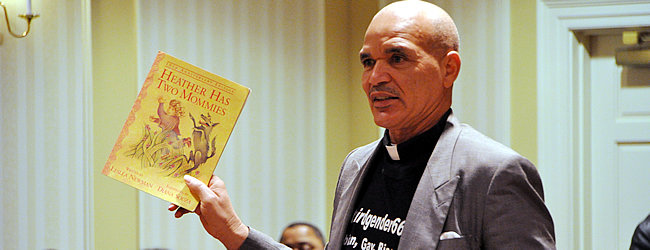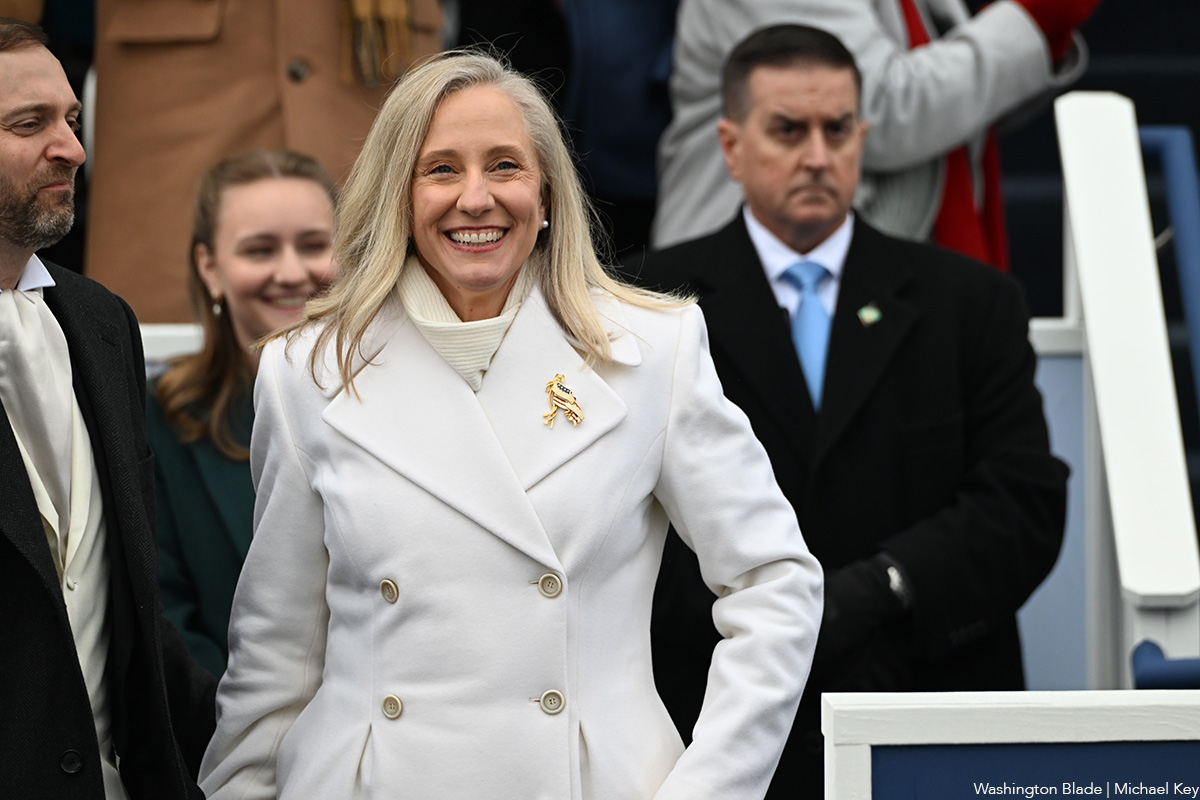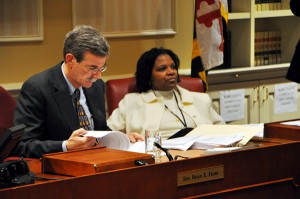Local
Ugly testimony at Md. marriage hearing
Opponents invoke pedophilia, incest while denouncing bill

ANNAPOLIS, Md. — As many as 300 supporters and opponents of a bill to legalize same-sex marriage in Maryland packed the halls of a State Senate office building in Annapolis Tuesday while several dozen witnesses testified on both sides of the issue.
The Democratic-controlled Judicial Proceedings Committee, which conducted a hearing on the bill, was expected to approve the measure and send it to the full Senate within the next week or two.
A majority of the members of the 11-person committee are co-sponsors or supporters of the bill, the Religious Freedom and Civil Marriage Protection Act.
Most political observers believe supporters have the votes to pass the bill in the Senate and the House of Delegates. Gov. Martin O’Malley has said he would sign the bill.
But opponents, led by Maggie Gallagher, chair of the National Organization for Marriage, said they remain hopeful that supporters would fall short of obtaining the 24 votes needed to pass the bill in the Senate or the 29 votes needed to stop a Senate filibuster.
“Marriage is the union of husband and wife for a reason,” Gallagher said in her testimony. “These are the only unions that can make new life and connect children in love to their mom and dad … If Maryland adopts this radical new view of marriage, it will have consequences,” she said.
Many of the witnesses testifying against the bill — including ministers, an orthodox rabbi, and two Roman Catholic priests — picked up on Gallagher’s view that procreation is the cornerstone of marriage. They said changing the definition of marriage to include same-sex couples would have a detrimental impact on families and society.
An equal number of witnesses, including a Catholic nun and Catholic lay leaders, two reform rabbis and at least a half-dozen Protestant ministers, both black and white, disputed those assertions, saying they believe same-sex unions strengthen rather than harm the family. Many of the witnesses backing the bill identified themselves as people of faith.
“My God loves everyone,” said Elbridge James, a lobbyist for the NAACP and director the Maryland Black Family Alliance.
“My God did not make a mistake,” he said. “And so if you were gay, my God did not make a mistake. If you were lesbian my God did not make a mistake. If you were transgender, my God did not make a mistake. And tonight, when I go home to my wife, nothing will deter me from loving my wife — certainly not if there’s a bill that protects gays, protects lesbians or protects the transgender community.”
Several of Maryland’s gay elected officials testified in favor of the bill. Among them was Sen. Richard Madaleno (D-Montgomery County), a co-sponsor of the bill who has been a longtime advocate for marriage equality in the state. Others included Chevy Chase, Md., Mayor David Loveland and Howard County Register of Wills Byron Macfarlane.
Among Republicans testifying in support of the bill was Sen. Allan Kittleman (R-Howard & Carroll Counties). Kittleman, the former Senate minority leader, initially planned to introduce a civil unions bill as a possible alternate measure to the marriage bill. Two weeks ago, he dropped those plans and announced his enthusiastic support for the marriage measure.
“I stand here as a strong Republican,” he told the committee, adding that he believes marriage equality is in full keeping with Republican principals of individual freedom.
Sen. Brian Frosh (D-Montgomery County), chair of the committee, said at the start of the hearing that more than 140 people signed up to testify.
Their names, organizational affiliation and information on whether they were for or against the bill weren’t immediately available because the committee did not release a witness list on the day of the hearing.
In a procedure unlike the equally packed hearing for a same-sex marriage bill approved by the D.C. City Council last year, the Judicial Proceedings Committee in Maryland required witnesses to sign up in person to testify on the morning of the hearing, preventing the committee from compiling an advance witness list and releasing it to the media.
Based on the testimony delivered during the day, it appeared that the witnesses were about equally divided between supporters and opponents of the bill. As Frosh and Sen. Lisa Gladen (D-Baltimore City), the committee’s vice chair, called witnesses to testify, many were not present, indicating that a significant number chose not to wait their turn to speak at a hearing that lasted more than six hours.
Lisa Polyak, a board member and spokesperson for Equality Maryland, the statewide LGBT organization that coordinated testimony in support of the bill, said the group lined up about 48 supporting witnesses. She said others supporting the bill, including a number of same-sex couples, came on their own.
“We were extremely gratified for all of the families that came out, all of our community partners, and all of the clergy that came out to speak their truth and support us,” she said. “I don’t think we could have had a better diversity of representation.”
Among those testifying was Polyak’s and her partner, Gita Deane’s daughter, 14-year-old Maya Deane-Polyak, a freshman at Baltimore’s Bryan Mawr High School.
“My moms’ first concern has always been my sister and I,” said Maya. “They make sure our every need is met, whether it is helping us with homework, driving us to a friend’s house or merely just being there to cheer us up when we are sad — they do it all and even more.”
Noting that she has witnessed first-hand examples of how her two moms encounter discrimination because they can’t marry in Maryland, she urged the committee to promptly approve the marriage bill.
“So I ask you to please consider, consider the fact that you have the power to change my family’s life when you make your decision,” she said. “I want our moms to be married. You have the power to make that happen.”
Many of the witnesses opposing the bill said broadening marriage to include same-sex couples would weaken the family structure and harm children. Several said children of same-sex parents don’t do as well in school and show greater signs of emotional problems compared to kids of opposite-sex, married parents. LGBT activists have said those assertions are not supported by impartial studies.
Austin Nimocks, senior legal counsel for the Alliance Defense Fund, a conservative litigation group that challenges same-sex marriage laws throughout the country, testified that restricting marriage to opposite-sex couples insures that children are raised by a “stable family.”
He said “responsible procreation” is a key reason why Maryland and other states should not legalize marriage for same-sex couples. By pushing to “redefine” marriage to include gay and lesbian couples “you are telling people that mothers and fathers don’t matter,” he told the committee.
In response to questions by committee member Jamie Raskin (D-Montgomery County), a co-sponsor of the marriage bill, Nimocks acknowledged that some same-sex couples may make good parents, saying “you can find individual circumstances that go against a general rule.”
But other witnesses opposing the bill said there could be no exceptions to their religious-based belief that child rearing by same-sex parents is always harmful to children, both psychologically and spiritually.
“That union of our parents was a sacred right granted to them by almighty God,” said Timonium, Md., resident Gerard Selby. “God’s design for the human race was that it be procreated by the union of a man and a woman.”
He added, “Where do we draw the lines? What comes next? If a man loses his wife to a premature death, shouldn’t he be allowed to marry his daughter, or son, or both?
Leroy Swales, an Oxon Hill, Md., resident who testified last year against the D.C. same-sex marriage bill, told the committee Tuesday that approval of the bill, among other things, would result in Maryland’s elementary schools using the book “Heather Has Two Mommies,” which he called a “pedophile book,” as a teaching aid for students.
Saying that homosexuality is related to an “electrical imbalance of the brain,” he called on the committee to use “science” and biblical scriptures as justification for defeating the bill.
Virginia
Va. activists preparing campaign in support of repealing marriage amendment
Referendum about ‘dignity and equal protection under the law’

Virginia voters in November will vote on whether to repeal their state’s constitutional amendment that defines marriage as between a man and a woman.
Democratic Gov. Abigail Spanberger on Feb. 6 signed House Bill 612 into law. It facilitates a referendum for voters to approve the repeal of the 2006 Marshall-Newman Amendment. Although the U.S. Supreme Court’s Obergefell ruling extended marriage rights to same-sex couples across the country in 2014, codifying marriage equality in Virginia’s constitution would protect it in the state in case the decision is overturned.
Maryland voters in 2012 approved Question 6, which upheld the state’s marriage equality law, by a 52-48 percent margin. Same-sex marriage became legal in Maryland on Jan. 1, 2013.
LGBTQ advocacy groups and organizations that oppose marriage equality mounted political campaigns ahead of the referendum.

Equality Virginia has been involved in advancing LGBTQ rights in Virginia since 1989.
Equality Virginia is working under its 501c3 designation in conjunction with Equality Virginia Advocates, which operates under a 501c4 designation, to plan campaigns in support of repealing the Marshall-Newman Amendment.
The two main campaigns on which Equality Virginia will be focused are education and voter mobilization. Reed Williams, the group’s director of digital engagement and narrative, spoke with the Washington Blade about Equality Virginia’s plans ahead of the referendum.
Williams said an organization for a “statewide public education campaign” is currently underway. Williams told the Blade its goal will be “to ensure voters understand what this amendment does and why updating Virginia’s constitution matters for families across the commonwealth.”
The organization is also working on a “robust media and voter mobilization campaign to identify and turn out voters” to repeal Marshall-Newman Amendment. Equality Virginia plans to work with the community members to guarantee voters are getting clear and accurate information regarding the meaning of this vote and its effect on the Virginia LGBTQ community.
“We believe Virginia voters are ready to bring our constitution in line with both the law and the values of fairness and freedom that define our commonwealth,” said Equality Virginia Executive Director Narissa Rahaman. “This referendum is about ensuring loving, committed couples and their families are treated with dignity and equal protection under the law.”
The Human Rights Campaign has also worked closely with Equality Virginia.
“It’s time to get rid of outdated, unconstitutional language and ensure that same sex couples are protected in Virginia,” HRC President Kelley Robinson told the Blade in a statement.
District of Columbia
D.C. police arrest man for burglary at gay bar Spark Social House
Suspect ID’d from images captured by Spark Social House security cameras

D.C. police on Feb. 18 arrested a 63-year-old man “of no fixed address” for allegedly stealing cash from the registers at the gay bar Spark Social House after unlawfully entering the bar at 2009 14th St., N.W., around 12:04 a.m. after it had closed for business, according to a police incident report.
“Later that day officers canvassing for the suspect located him nearby,” a separate police statement says. “63-year-old Tony Jones of no fixed address was arrested and charged with Burglary II,” the statement says.
The police incident report states that the bar’s owner, Nick Tsusaki, told police investigators that the bar’s security cameras captured the image of a man who has frequently visited the bar and was believed to be homeless.
“Once inside, the defendant was observed via the establishment’s security cameras opening the cash register, removing U.S. currency, and placing the currency into the left front pocket of his jacket,” the report says.
Tsusaki told the Washington Blade that he and Spark’s employees have allowed Jones to enter the bar many times since it opened last year to use the bathroom in a gesture of compassion knowing he was homeless. Tsusaki said he is not aware of Jones ever having purchased anything during his visits.
According to Tsusaki, Spark closed for business at around 10:30 p.m. on the night of the incident at which time an employee did not properly lock the front entrance door. He said no employees or customers were present when the security cameras show Jones entering Spark through the front door around 12:04 a.m.
Tsusaki said the security camera images show Jones had been inside Spark for about three hours on the night of the burglary and show him taking cash out of two cash registers. He took a total of $300, Tsusaki said.
When Tsusaki and Spark employees arrived at the bar later in the day and discovered the cash was missing from the registers they immediately called police, Tsusaki told the Blade. Knowing that Jones often hung out along the 2000 block of 14th Street where Spark is located, Tsusaki said he went outside to look for him and saw him across the street and pointed Jones out to police, who then placed him under arrest.
A police arrest affidavit filed in court states that at the time they arrested him police found the stolen cash inside the pocket of the jacket Jones was wearing. It says after taking him into police custody officers found a powdered substance in a Ziploc bag also in Jones’s possession that tested positive for cocaine, resulting in him being charged with cocaine possession in addition to the burglary charge.
D.C. Superior Court records show a judge ordered Jones held in preventive detention at a Feb. 19 presentment hearing. The judge then scheduled a preliminary hearing for the case on Feb. 20, the outcome of which couldn’t immediately be obtained.
District of Columbia
Judge rescinds order against activist in Capital Pride lawsuit
Darren Pasha accused of stalking organization staff, board members, volunteers

A D.C. Superior Court judge on Feb.18 agreed to rescind his earlier ruling declaring local gay activist Darren Pasha in default for failing to attend a virtual court hearing regarding an anti-stalking lawsuit brought against him by the Capital Pride Alliance, the group that organizes D.C.’s annual Pride events.
The Capital Pride lawsuit, initially filed on Oct. 27, 2025, accuses Pasha of engaging in a year-long “course of conduct” of “harassment, intimidation, threats, manipulation, and coercive behavior” targeting Capital Pride staff, board members, and volunteers.
In his own court filings without retaining an attorney, Pasha has strongly denied the stalking related allegations against him, saying “no credible or admissible evidence has been provided” to show he engaged in any wrongdoing.
Judge Robert D. Okum nevertheless on Feb. 6 approved a temporary stay-away order requiring Pasha to stay at least 100 feet away from Capital Pride’s staff, volunteers, and board members until the time of a follow-up court hearing scheduled for April 17. He reduced the stay-away distance from 200 yards as requested by Capital Pride.
In his two-page order issued on Feb. 18, Okun stated that Pasha explained that he was involved in a scooter accident in which he was injured and his phone was damaged, preventing him from joining the Feb. 6 court hearing.
“Therefore, the court finds there is a good cause for vacating the default,” Okun states in his order.
At the time he initially approved the default order at the Feb. 6 hearing that Pasha didn’t attend, Okun scheduled an April 17 ex parte proof hearing in which Capital Pride could have requested a ruling in its favor seeking a permanent anti-stalking order against Pasha.
In his Feb. 18 ruling rescinding the default order Okun changed the April 17 ex parte proof hearing to an initial scheduling conference hearing in which a decision on the outcome of the case is not likely to happen.
In addition, he agreed to consider Pasha’s call for a jury trial and gave Capital Pride 14 days to contest that request. The Capital Pride lawsuit initially called for a non-jury trial by judge.
One request by Pasha that Okum denied was a call for him to order Capital Pride to stop its staff or volunteers from posting information about the lawsuit on social media. Pasha has said the D.C.-based online blog called DC Homos, which Pasha claims is operated by someone associated with Capital Pride, has been posting articles portraying him in a negative light and subjecting him to highly negative publicity.
“The defendant has not set forth a sufficient basis for the court to restrict the plaintiff’s social media postings, and the court therefore will deny the defendant’s request in his social media praecipe,” Okun states in his order.
A praecipe is a formal written document requesting action by a court.
Pasha called the order a positive development in his favor. He said he plans to file another motion with more information about what he calls the unfair and defamatory reports about him related to the lawsuit by DC Homos, with a call for the judge to reverse his decision not to order Capital Pride to stop social media postings about the lawsuit.
Pasha points to a video interview on the LGBTQ Team Rayceen broadcast, a link to which he sent to the Washington Blade, in which DC Homos operator Jose Romero acknowledged his association with Capital Pride Alliance.
Capital Pride Executive Director Ryan Bos didn’t immediately respond to a message from the Blade asking whether Romero was a volunteer or employee with Capital Pride.
Pasha also said he believes the latest order has the effect of rescinding the temporary stay away order against him approved by Okun in his earlier ruling, even though Okun makes no mention of the stay away order in his latest ruling. Capital Pride attorney Nick Harrison told the Blade the stay away order “remains in full force and effect.”
Harrison said Capital Pride has no further comment on the lawsuit.




















